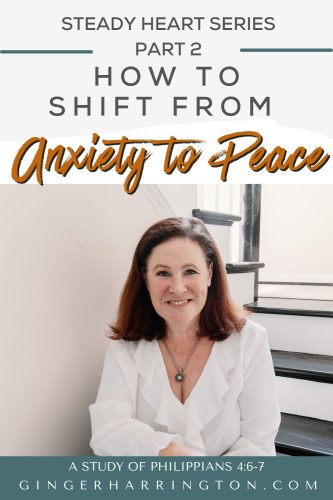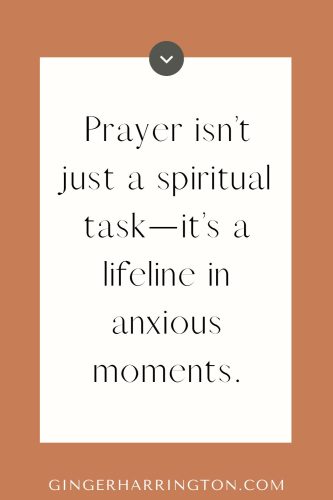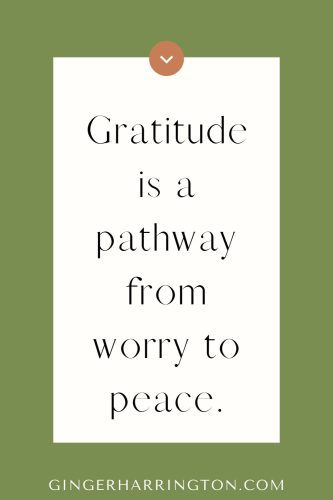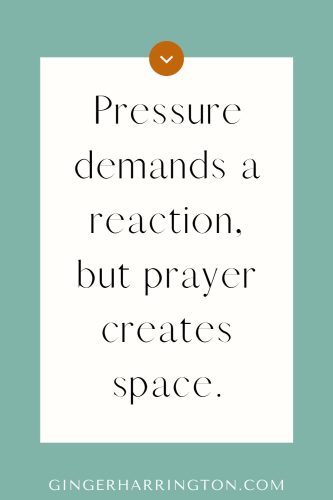Discover how Philippians 4:6–7 offers God’s strategy for anxiety. Learn how prayer with thanksgiving shifts worry into peace that guards your heart and mind.
We’ve all had those moments when anxiety presses in. Your heart races, your jaw tightens, and your mind spins in a dozen directions. You replay conversations, anticipate the worst, or feel overwhelmed by all that isn’t done.
What if the very pressures that unsettle us became the place where God steadies us?
That’s exactly what the apostle Paul writes about in Philippians 4:6–7:
“Be anxious for nothing, but in everything by prayer and supplication with thanksgiving let your requests be made known to God. And the peace of God, which surpasses all comprehension, will guard your hearts and your minds in Christ Jesus.”
This passage isn’t just good advice. It’s a spiritual strategy for shifting from anxiety to peace. Welcome to the second part The Steady Heart Series based on Philippians 4:1-9. Last week we kicked of the series with a study on Philippians 4:4-5: How to Choose Joy in Hard Times.
In this article, we’ll walk through Paul’s teaching in Philippians 4:6–7 and discover how prayer with thanksgiving helps us shift from anxiety to peace. You’ll learn:
- What Philippians 4:6 really means about anxiety (be anxious for nothing explained)
- How prayer interrupts the anxiety spiral
- The difference between prayer and supplication — and why both matter
- Why thanksgiving is the hinge that opens the door to peace
- How gratitude transforms anxious thoughts
- The surprising connection between neuroscience and Scripture
- Practical ways to turn worry into prayer in daily life
- The kind of peace God promises to guard your heart and mind
Along the way, you’ll find sticky statements to remember, reflective questions to consider, and practical steps to put this into action.

What Does Philippians 4:6 Say About Anxiety?
Paul’s words may sound impossible: “Be anxious for nothing.” On a hard day, it can feel like he’s asking the impossible. But the original language helps us see the meaning. The Greek word for anxious means “to be pulled apart” or “to be mentally distracted.” That’s exactly what anxiety does — it scatters our focus and steals our peace.
Paul isn’t commanding us never to feel anxious. He’s inviting us to respond differently. Instead of letting worry take over, we are to bring everything to God in prayer, shaped by thanksgiving.
Anxiety divides your thoughts, but prayer aligns them with God.
When you feel anxious, what usually pulls your thoughts apart — and what might it look like to let prayer bring them back together?
How Prayer Interrupts the Anxiety Spiral
Anxiety thrives when we stay in reaction mode. Our minds jump to “what if” scenarios, our bodies tense, and we make decisions we later regret. Prayer changes the dynamic. It slows us down, creates space, and reminds us that God is near.
Think of it like a treadmill. When anxiety ramps up, it’s like being dragged along at a speed you can’t handle. Prayer is the pause button. You’re still in the gym, but the machine stops pulling you faster than you can go.
Pressure demands a reaction, but prayer creates space.
What Does Supplication Mean in Philippians 4:6?
Paul doesn’t just say “pray.” He uses two words: prayer and supplication. Prayer is our ongoing conversation with God. Supplication is different — it’s when we cry out with deep need, whether for ourselves or for others.
It’s not a word we use often. I’ve never asked a friend, “How’s your supplication going?” But the concept matters. Supplication is what Jesus prayed in Gethsemane — honest, dependent, desperate prayer.
Supplication is simply asking big when life feels heavy.

Why Thanksgiving Is Essential in Prayer
It’s easy to overlook thanksgiving in this verse, but it’s not optional. Gratitude reframes the whole moment. Instead of being trapped in fear, thanksgiving shifts our attention to what God has already done and who He is.
Gratitude doesn’t always come naturally. You may not feel thankful in the middle of stress. But gratitude is a choice, not an emotion. Feelings don’t get to boss us around.
Thanksgiving isn’t a postscript; it’s the hinge that turns anxiety into peace.
What is one thing you could thank God for in the middle of your stress today?
Can Gratitude Really Shift Anxiety?
When we’re anxious, our thoughts zoom in on everything uncertain. Gratitude zooms out and widens our view to see what is still true. Choosing thanksgiving in prayer anchors us in God’s goodness.
You may have heard the phrase, “Gratitude is a choice.” It’s true. We can practice thanksgiving even when we don’t feel it. And over time, gratitude builds resilience.
Gratitude is a pathway from worry to peace.

The Science Behind Prayer and Anxiety
I love how science echoes what God has already told us. When we’re anxious, the amygdala — the brain’s fear center — lights up. But when we pray with thanksgiving, the prefrontal cortex — the reasoning, calming part of the brain — is activated. Studies show this practice lowers cortisol, strengthens emotional resilience, and increases well-being.
Neuroscientist Dr. Caroline Leaf explains in Switch On Your Brain that gratitude and intentional thought patterns can literally rewire neural pathways, calming anxiety and strengthening healthier responses over time. Her research highlights how renewing the mind through practices like prayer and thanksgiving creates measurable changes in the brain.
God’s wisdom in Scripture is confirmed by how He designed our brains.
Romans 12:2 reminds us to renew our minds. Neuroscience shows that gratitude and prayer literally rewire thought patterns, making peace more accessible.
Practical Ways to Turn Worry into Prayer
So how do we live this out? Here are simple practices that make prayer and thanksgiving part of daily life:
- Create a pause prayer. Whisper: “Lord, I give this to You. Thank You that You’re here.”
- Use triggers as prompts. Let rising stress be the reminder to stop and pray.
- Visual cues. A sticky note on your mirror, a bracelet on your wrist, or a lock screen on your phone can nudge you toward prayer.
- Journaling. Write one thing you’re thankful for at the start of your quiet time.
- Pray in the moment. Don’t wait. If someone shares a need, stop and pray right then.
Practice when life is calm, so prayer comes naturally when the storm hits.
What Kind of Peace Does God Promise?
Paul describes peace that “guards your heart and mind in Christ Jesus.” This isn’t just a fleeting calm. It’s protective, like a guard standing watch over your emotions and thoughts.
Sometimes peace comes immediately, like a rush of quiet confidence. Other times it comes gradually, as you keep praying and thanking. Both are real.
Peace doesn’t mean you’re certain—it means you’re surrendered.
When have you experienced God’s peace guarding your heart, even if your circumstances didn’t change?

A Personal Example
This prayer strategy wasn’t something I picked up from a book—it was insight the Lord gave me as I meditated on Philippians 4:6–7. I began to realize that prayer and thanksgiving together form a powerful hinge that shifts the heart from anxiety to peace.
Not long after, I faced a worry of my own. I had just started working with a new literary agent, and doubt whispered, “You’re not ready. You can’t do this.” That familiar pressure of anxiety crept in.
But God brought this passage to mind, and I decided to put it into practice on the spot. I prayed about my fear, and then—almost experimentally—I began to thank Him. I thanked Him for the opportunity, for His presence in the process, and for the ways He had been faithful in the past.
The situation didn’t change, but something in me did. My focus shifted, and peace settled in where anxiety had been.
That’s the power of Philippians 4:6–7: turning worry into prayer with thanksgiving opens the door to God’s peace.
One Step You Can Take This Week
Don’t try to master this all at once. Start small:
- Write your pause prayer.
- Choose two things you’re grateful for before the day begins.
- Ask yourself: “What’s one pressure I don’t need to carry alone today?”
Hope doesn’t begin when anxiety disappears. It begins when you choose to pray with gratitude in the middle of it.
FAQ: Philippians 4:6–7 on Anxiety and Prayer
Q: Does “be anxious for nothing” mean I should never feel anxious?
No. Paul isn’t saying you’ll never experience anxious thoughts or feelings. The Greek word means “to be pulled apart or distracted.” His point is that when anxiety comes, we can respond differently—through prayer with thanksgiving, trusting God to guard our hearts.
Q: What’s the difference between prayer and supplication?
Prayer is our ongoing conversation with God about everything. Supplication is a deeper cry of dependence when we or someone we love has a specific need. Both are important, and Philippians 4:6 shows how they work together.
Q: Why is thanksgiving such a big deal in prayer?
Thanksgiving reframes prayer. It shifts focus from fear and “what if” thinking to God’s faithfulness and goodness. Gratitude is the hinge that opens the way from worry into peace.
Q: Does God always take anxiety away immediately when we pray?
Not always. Sometimes His peace comes quickly; other times it unfolds gradually as we keep praying and thanking Him. Either way, God promises His peace will guard our hearts and minds.
Be Anxious for Nothing: God’s Promise of Peace
Friend, if you feel anxious, it doesn’t mean you’re weak. It doesn’t mean you lack faith. It means you’re human. But God meets you right where you are — with His strength, presence, and peace.
Whisper a prayer. Say, “Thank You, Lord, for being here.”
Peace is not about controlling the outcome. It’s about surrendering to the One who guards your heart and mind.
Mentioned in this post:
Switch on Your Brain by Dr. Caroline Leaf
*This post contains affiliate links at no cost to you.
The Steady Heart Series
-
- Part 1:How to Choose Joy in Hard Times: A Study of Philippians 4:4-5
- Part 2: How to Shift from Anxiety to Peace: A Study of Philippians 4:6
- Part 3: How to Find God’s Peace That Guards Your Heart: A Study of Philippians 4:7
- Part 4: How to Filter Your Thoughts and Find Peace: A Study of Philippians 4:8-9
Related Content
- 10 Habits of Peace: A Complete Guide to Experiencing God’s Peace
- Why Positive Thinking is Good for a Healthy Body, Soul, and Spirit
- Why You Should Stop Discounting Your Anxiety
- Are Your Feelings Defining Your Faith
- 10 Free Resources for an Emotionally Health You
- 20 Toxic Ways of Thinking That Will Poison Your Life
- 3 Reasons Why You Should Let Go of Negative Thinking
- Strategies and Scriptures to Combat Negative Thinking: With Free E-book
This post is for encouragement and inspirational purposes only. It reflects biblical insights and personal experiences related to faith and anxiety. It is not intended to diagnose, treat, or replace professional medical or mental health care. If you are struggling with anxiety or other mental health concerns, please seek support from a qualified counselor, physician, or mental health professional.
Ginger Harrington is the author of Holy in the Moment: Simple Ways to Love God and Enjoy Your Life, and host of the Habits of Hope Podcast. With warmth and practical wisdom, she encourages women to cultivate hope and a deeper life in Christ for heart and home. Through writing, speaking, and resources like the Steady Heart Series, Ginger helps readers discover rhythms of faith that steady the soul in anxious times.

 So glad you're here. I help busy women—gals like you— build healthy habits for living well with biblical wisdom and practical steps to deepen your faith, increase your hope, and thrive in your purpose.
So glad you're here. I help busy women—gals like you— build healthy habits for living well with biblical wisdom and practical steps to deepen your faith, increase your hope, and thrive in your purpose.



